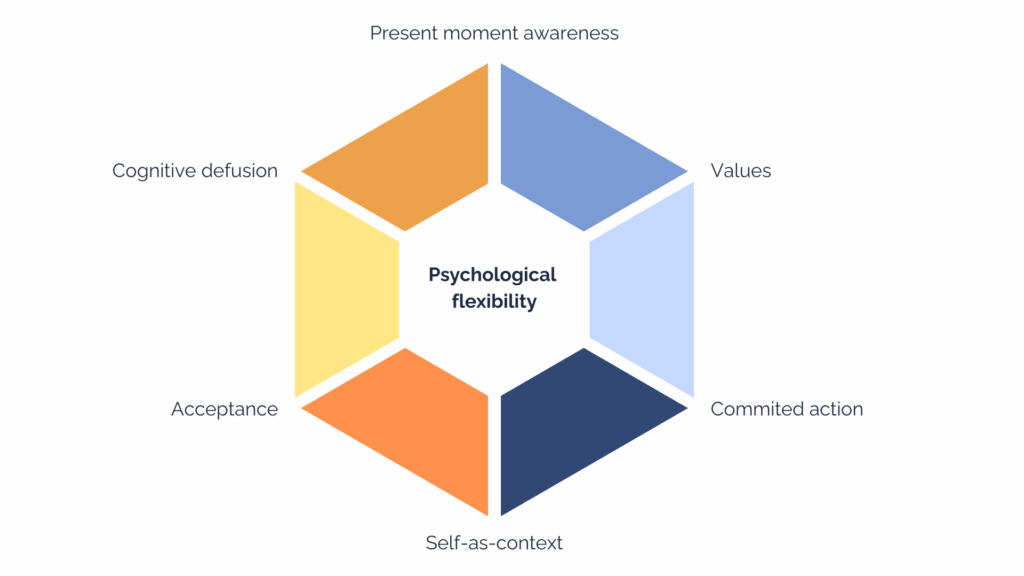According to the Cleveland Clinic: “Acceptance and commitment therapy (ACT) is a type of mental health therapy that helps you acknowledge your relationship with your thoughts and feelings. You learn to understand your feelings instead of changing them. You’ll work on reframing your values and adjusting your behaviors to better match them.”
Yes, ACT is all that, but what really is ACT? Don’t get me wrong, scientific definitions are important but what I don’t want to do today is to make ACT seem like it’s a sort of method that is bigger and better than all other therapeutic modalities, add a bunch of complicated psychology words and hope that the general public who don’t spend most of their free times reading about ACT will fully understand what I mean. Instead, what I will attempt to do is to make ACT accessible and easy to understand for you, so that if you are thinking about getting a psychologist or starting with me, you’ll know exactly or at least a little bit about what you are getting yourself into and what you are spending your money on. An important remark to make though, is that ACT is actually one of the most well-researched therapeutic approaches out there. It’s backed by thousands of studies, meta-analyses, and ongoing research, making it not just practical and relatable, but also deeply rooted in science.
Before I get into how ACT was developed, I just wanted to let you know that ACT is pronounced as a word and not as separate letters like A C T. It’s just pronounced as ACT-tion, or ACT-ing, ACT. And now that we got this out of the way, let’s see how it all began.
The originator behind ACT, is Dr Steven C. Hayes. He is an incredible man who I had the chance to meet and train from, and hopefully will be able to do so for a long long time still. But he is an incredible man, therapist, scientist, researcher and also song-writer with AI song maker programs. Throughout his entire career and still up to this day, he works tirelessly to end human suffering, change the world and help people achieve psychological flexibility.
Psychological flexibility is the central concept of ACT. It basically refers to this idea that we as human beings are able to make contact with all our experiences in the present, comfortable or uncomfortable without fighting these or defending ourselves from them. So basically the ability to be fully present and open to all experiences even the ones that really suck and still be able to act in a way that brings us closer to what’s really important to us and what we truly yearn for. This might sound a bit crazy or like it’s impossible, but the good news is that psychological flexibility is a set of skills, which can be learned, practiced and then used in all of life’s different stages, even the painful ones.
In order to achieve psychological flexibility, Steven, and his colleagues also developed this thing called the ACT Hexaflex. Another seemingly complicated concept. I will attach a photo below about this hexaflex to confuse you even more, but don’t worry I simplified it a bit for your convenience.

As you can see, the center of the entire hexaflex is psychological flexibility. The other 6 elements are basically different core processes that you and your psychologist can work on/with to achieve psychological flexibility. Basically, these 6 processes are the helpers or the tools that you can learn and practice with to be more psychologically flexible. The way we’d touch on these different processes totally depends on the client. We might touch on values one session and on defusion the other. But most of the time, even just by talking and asking questions, one session can already touch on all or most of the 6 processes. It’s important to stay psychologically flexible as a psychologist as well. 🙂
Now, you might be wondering what all of these processes mean. Fair enough… I also thought about how I could explain this in short, but I realized that I don’t want to restrict myself and I also don’t want to write really really long blog posts. So I decided that instead of writing about them, I will record a podcast episode on each of these 6 core processes so you can listen to it while walking, biking, driving or cooking.
Just as a concluding thought, ACT is really not just a method, a technique or a tool, it’s a life philosophy, a way of life that you can extend to pretty much all areas. Whether that’s physical exercise, mental health, chronic pain, or relationships. I hope you found this post helpful and it was also useful for you to read about what I do and what I can help you with. I am looking forward to sharing the podcast episodes about the 6 core processes with you, so don’t forget to check my website for updates on this.



